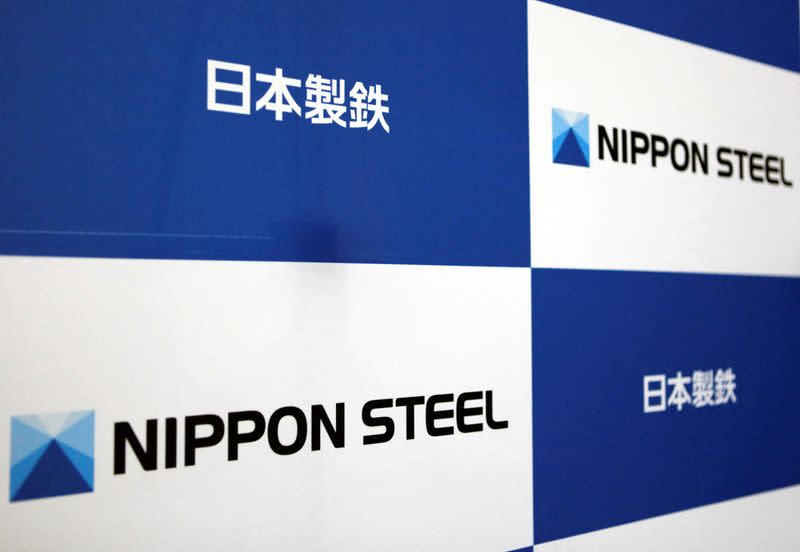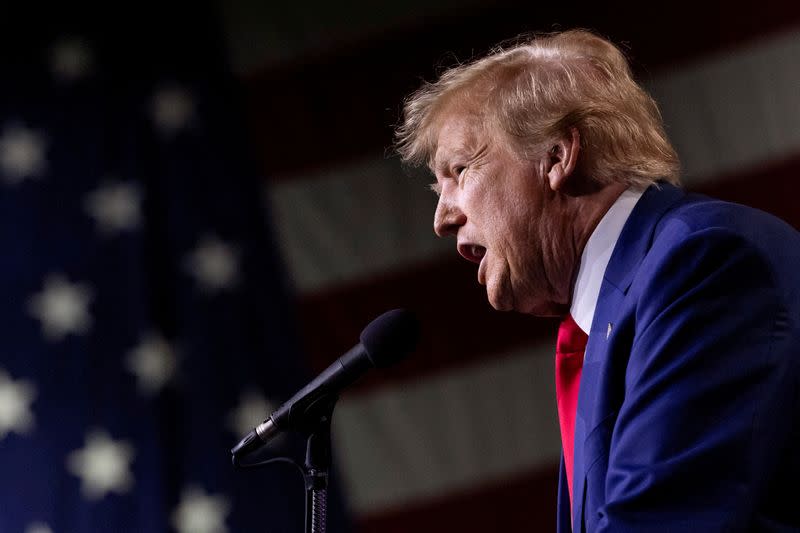Analysis-Trump adds to Nippon-U.S. Steel deal woes in blow for Japan Inc
By Anton Bridge, John Geddie and Daniel Leussink
TOKYO (Reuters) - Donald Trump's pledge to block Nippon Steel's planned purchase of U.S. Steel if he retakes the White House compounds political troubles for the $15 billion deal whose failure could reverberate across Japan Inc.
For Japan, the biggest foreign investor in the U.S., a collapse of the deal could give companies pause about acquisitions in other strategic sectors and force them to be more risk averse when sizing up deals, say former officials, lawyers, analysts and executives.
The planned purchase by the world's fourth-largest steelmaker of the storied American firm underlines the limits of "friendshoring", a term coined by U.S. officials to describe deeper economic cooperation between allies, an effort partly aimed at de-risking supply chains from rival power China.
Nippon Steel's acquisition already faces high hurdles, drawing criticism from Democratic and Republican lawmakers and the powerful United Steelworkers union.
Failure could be "a warning sign to some segments of Japanese investors", said Kenichiro Sasae, who was Japan's ambassador to the U.S. at the start of Trump's 2017-2021 term as president.
While the fallout might be limited to specific sensitive industries, it would show that even with more focus on economic cooperation between allies, countries will always decide based on their own core interests, said Sasae, president of the Japan Institute of International Affairs think tank.
Opposition to the deal appears at odds with U.S. efforts in recent years to encourage Japanese companies to boost their presence there. It is reminiscent of the 1980s, when Japanese acquisitions of trophy assets like Rockefeller Center ignited sharp criticism from the American public.
COSTS COULD RISE
In 2015, U.S. regulators, citing competition concerns, scuttled a merger between Japan's Tokyo Electron and U.S.-based Applied Materials, two of the world's largest manufacturers of semiconductor-making machinery.
Trump, whose protectionist "America First" policies were a hallmark of his tenure, said on Wednesday he would "instantaneously" block the deal if he wins the Nov. 5 vote. The Republican is set for a likely rematch with President Joe Biden, a Democrat.
Nippon Steel responded that the purchase would provide great benefit to U.S. Steel, the U.S. steel industry, its customers, employees, local communities and the United States more broadly.
"Failure to strike a deal has the potential to damage investment ties and set back friendshoring initiatives," said Stefan Angrick, senior economist at Moody's Analytics in Tokyo.
"The long-term consequences would be higher costs for businesses and consumers," said Angrick, who expects the deal to pass eventually.
Japan's direct investment in the U.S. hit 27 trillion yen ($180 billion) in 2022, according to the latest finance ministry data, compared with just 1.4 trillion yen ($10 billion) in Japan's other top trading partner, China.
Japanese firms are under increasing pressure to expand abroad to find new revenue sources as the population in their ageing home market shrinks.
Half of Japanese companies operating in the U.S. planned to expand their business there in coming years while fewer than a third of those in China planned to do so, according to a November survey by government-backed trade promotion agency JETRO.
'WE THOUGHT WE WERE ALIGNED'
Concerns over Nippon Steel's attempt to buy a company that helped build the Empire State Building and arm allied forces in World War Two have arisen since its December announcement.
Biden's White House says the deal deserves "serious scrutiny" given its potential impact on national security and supply chain reliability. It said it supported a review of the transaction by the Committee on Foreign Investment in the United States, a process that could take months.
Japan's industry minister declined to comment on Trump's remark about the deal on Friday but said the U.S.-Japan alliance was stronger than ever.
Chuck Rocha, a Democratic strategist and former political director for the steelworkers' union, said it would be hard for the Biden administration to approve the deal.
"I think there's certain core industries that you just don't outsource," said Rocha. "It's not called ABC Steel. It ain't called Your Mama's Steel. It's called U.S. Steel."
The steelworkers, criticising both companies for not consulting with them on the acquisition, have urged regulators to scrutinise whether the deal benefits workers.
Biden and Trump have been competing to win the support of unions, which could prove crucial in the battleground states expected to decide the election.
Nick Wall, a Tokyo-based partner at law firm Allen & Overy who advises on M&A deals, said the blowback from the Nippon-U.S. Steel deal shows Japanese firms will have to be more thorough when examining transactions, especially in unionised industries.
"You'd spend a lot more time thinking through other stakeholders - how they're going to respond, what engagement you should have with them before you announce the deal, bringing along PR experts to help you refine and polish the message," he said.
A former senior Japanese government official who now works for a Japanese conglomerate said the deal was a stark reminder that firms must be more mindful about studying the political implications of deals in the United States.
"It should be of big interest for all internationalizing Japanese companies, especially when thinking about future investment in U.S. companies," he said on condition of anonymity because he was not authorised to speak to media.
"We thought we're completely aligned countries."
(Reporting by Anton Bridge, John Geddie, Daniel Leussink, Nobuhiro Kubo and Kantaro Komiya in Tokyo, and Trevor Hunnicutt in Washington; Editing by William Mallard)


